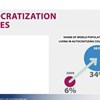agrees
Different Populations Agree on Which Moral Arguments Underlie Which Opinions
Frontiers in Psychology AbstractPeople often justify their moral opinions by referring to larger moral concerns (e. g., “It isunfairif homosexuals are not allowed to marry!” vs. “Letting homosexuals matraditions!”). Is there a general agreement about what concerns apply to different moral opinions? We used surveys in the United States and the United Kingdom to measure the perceived applicability of eight concerns (harm, violence, fairness, liberty, authority, ingroup, purity, and governmental overreach) to a wide range of moral opinions. Within countries, argument applicability scores were largely similar whether they were calculated among women or men, among young or old, among liberals or conservatives, or among people with or without higher education. Thus, the applicability of a given moral concern to a specific opinion can be viewed as an objective quality of the opinion, largely independent of the population in which it is measured. Finally, we used similar surveys in Israel and Brazil to establish that this independence of populations also extended to populations in different countries. However, the extent to which this holds across cultures beyond those included in the current study is still an open question.
Restricted completion of sparse partial Latin squares.
Combinatorics, Probability and Computing, 1-21. doi:10.1017/S096354831800055X, Cambridge University Press. Abstract An n × n partial Latin square P is called α-dense if each row and column has at most αnnon-emp times in . An × array where each cell contains a subset of {1,…, } is a (, ) -array if each symbol occurs at most times in each row and column and each cell contains a set of size at most . Combining the notions of completing partial Latin squares and avoiding arrays, we prove that there are constants , > 0 such that, for every positive integer , if is an -dense × partial Latin square, is an × -array, and no cell of contains a symbol that appears in the corresponding cell of , then there is a completion of that avoids ; that is, there is a Latin square that agrees with on every non-empty cell of , and, for each , satisfying 1 ≤ , ≤ , the symbol in position (, ) in does not appear in the corresponding cell of .
Qué futuro tiene el futuro? El País reports on our AI research
"We live in an unpredictable time, the leading experts in artifical intelligence tell us. They have no answers and ordinary citizens are not even capable of asking the pertinent questions. We traveled
Defining Social Housing: A Discussion on the Suitable Criteria
Housing, Theory and Society 36(2): 149–166. doi.org/10.1080/14036096.2018.1459826. Abstract The term social housing has been characterized as a “floating signifier”, i.e. a term with no agreed-upon meanin
Climate change: Life and death
John Broome, White's Professor of Moral Philosophy The international community has agreed on the aim of avoiding dangerous interference with the climate system. Determining what level of interference i

Anna Lührmann: Walking the Talk. Which Parties Threaten Democracy?
The recent increase of democratic declines around the world has sparked a new generation of studies on the topic. Scholars agree that these days the main threat to democracy arises from democratically
Schools and segregation – a positive example
The importance of socio-economic background will become increasingly important for school success. But segregation in the school area is steadily growing and inequality is increasing, a development tha
European Social Models, Protection and Inclusion
Institute for Futures Studies Research Report 2009/1, 101p. The Member States of the European Union have agreed to promote the common goals of economic growth, quality of jobs and comprehensive social

Futures: Climate policies and public support in the US - the way forward
Many agree that some aggressive policy changes need to be put in place when it comes to climate change. Megan Mullin, associate professor of environmental politics at Duke University’s Nicholas School
20 MSEK to research program on Agenda 2030
The project Transformative partnership for sustainable development, led by Karin Bäckstrand, has been granted 20 million SEK from the Research Council Formas. The title of the project is "Transformative EnvironmentalStockholm








